Events and Activities
Nora Kottmann studies family practices of highly mobile, multi-local families
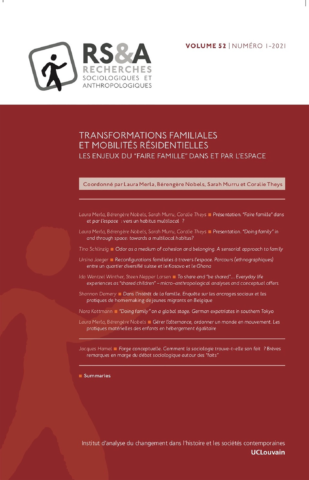
A new, open access article by DIJ principal researcher Nora Kottmann explores the relationship between “doing family”, mobilities, and space through a focus on expatriate families. “‘Doing family’ on a global stage. German expatriates in southern Tokyo” (Recherches sociologiques et anthropologiques, 52-1, 2021) draws on long term ethnographic fieldwork, including a variety of qualitative methods like interviews, conversations, and auto-ethnographic accounts. Utilizing the concepts of “doing family” the article asks: how and where do these highly mobile individuals do family? The analysis shows that approaches to doing family as well as the ensuing practices are diverse and dependent on various factors. It also reveals the emergence of key practices, including “displays” of family, that are highly structured by gender. Overall, the findings show the need for place-, space- and context-sensitive analyses even among a group of highly mobile families. This article is an outcome of Nora’s research project Relationships in motion: Doing belonging on a global stage.
Open access article by Sonja Ganseforth examines fish as cyborgs and commodities

Despite the central role of seafood in Japanese cuisine, domestic fisheries are facing a severe crisis. “Shifting Matter and Meanings in Japanese Seafood Assemblages: Fish as Functional Food Cyborgs and Emblematic Cultural Commodities” (Green Letters, online first) by DIJ principal researcher Sonja Ganseforth examines the changing cultural and socio-economic meanings and matter of fish in Japanese seafood assemblages. Sonja’s study is based on anthropological field research in fishing communities in southwestern Japan as well as on a sampling of cultural representations of fish. Her analysis finds a growing polarisation in the Japanese seafood sector: highly-processed food products and globally traded commodities inundate markets and dinner plates, while locally caught animals turn from basic foodstuff into folklorist stars of a vanishing rurality, a symbol of authenticity and national identity. The article is available open access and an outcome of Sonja’s research project Fishing communities between growth and demise.
New DIJ lecture series kicks off with talk on post-3/11 literature
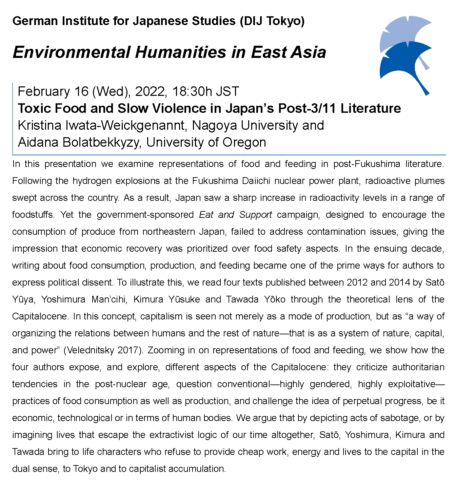 Following the hydrogen explosions at the Fukushima Daiichi nuclear power plant, Japan saw a sharp increase in radioactivity levels in a range of foodstuffs. Yet the government encouraged the consumption of produce from northeastern Japan and failed to address contamination issues. In the past decade, writing about food consumption, production, and feeding became a prime way for authors to express political dissent. This presentation will focus on representations of food and feeding in texts published between 2012 and 2014 by Satō Yūya, Yoshimura Man’ichi, Kimura Yūsuke, and Tawada Yōko. Through the theoretical lens of the Capitalocene, it will show how the authors criticize authoritarian tendencies in the post-nuclear age and question conventional practices of food consumption. This lecture kicks off the new DIJ lecture series Environmental Humanities in East Asia, organised by Barbara Geilhorn. Lectures in this series will address the damage/protection of our environment, ecocriticism, climate change, the relation between human beings, nature and other living beings. Details and registration here
Following the hydrogen explosions at the Fukushima Daiichi nuclear power plant, Japan saw a sharp increase in radioactivity levels in a range of foodstuffs. Yet the government encouraged the consumption of produce from northeastern Japan and failed to address contamination issues. In the past decade, writing about food consumption, production, and feeding became a prime way for authors to express political dissent. This presentation will focus on representations of food and feeding in texts published between 2012 and 2014 by Satō Yūya, Yoshimura Man’ichi, Kimura Yūsuke, and Tawada Yōko. Through the theoretical lens of the Capitalocene, it will show how the authors criticize authoritarian tendencies in the post-nuclear age and question conventional practices of food consumption. This lecture kicks off the new DIJ lecture series Environmental Humanities in East Asia, organised by Barbara Geilhorn. Lectures in this series will address the damage/protection of our environment, ecocriticism, climate change, the relation between human beings, nature and other living beings. Details and registration here
Speakers:
Kristina Iwata-Weickgenannt, Nagoya University & Aidana Bolatbekkyzy, University of Oregon
Japan Jahrbuch: DIJ researchers and alumni look back at Japan 2021
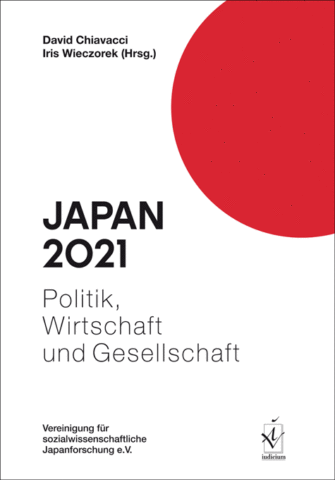
The latest issue of the Japan Jahrbuch, the yearbook published by the German Association for Social Science Research on Japan, includes several articles (in German) written by current and former DIJ researchers on Japanese politics, economics, history, society, and law. DIJ director Franz Waldenberger explains lessons from Japan’s economic development while DIJ principal researcher Torsten Weber (with Anke Scherer, Bochum) analyses historical debates and historical consciousness. Articles by DIJ alumni include overviews of Japan’s domestic politics by Christian G. Winkler (Seinan Gakuin University) and of post-Abe foreign and security policies by Kai Schulze (Berlin), on a class action lawsuit against TEPCO and the government by Anna Wiemann (Munich) and Köksal Sahin, on images of family households in Japanese media by Stefanie Reitzig, and on Japan as a dual earner society by Annette Schad-Seifert (Dusseldorf). For more details please see the table of content. The book is available as softcover and e-book from the publisher here.
New open-access DIJ Miscellanea Comparing Comparisons
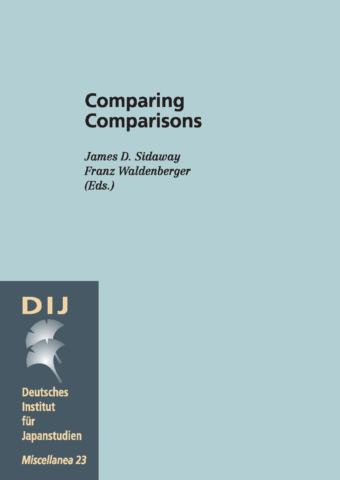
Comparing Comparisons, edited by James D. Sidaway and DIJ director Franz Waldenberger, is the latest volume published in our open-access DIJ Miscellanea series. It investigates which role comparisons play in different research fields, ultimately tackling the question of how and why we compare in the social sciences and humanities. The nine short essays collected in this volume reflect on aspects, methods, benefits, and possible pitfalls of comparisons from the perspectives of anthropology, economics, history, geography, Japanese Studies, and Southeast Asian Studies. It also tackles the problem of commodification and decolonization of comparisons. Contributors include DIJ principal researchers Isaac Gagné, Markus Heckel, Nora Kottmann and members of the DIJ’s research group on “Borders, Mobility and New Infrastructures” at the National University of Singapore. The essays were originally published as blog entries on the open edition platform Hypotheses between May 2020 and May 2021. More details and link to download the PDF here.
Season’s Greetings and best wishes for the New Year
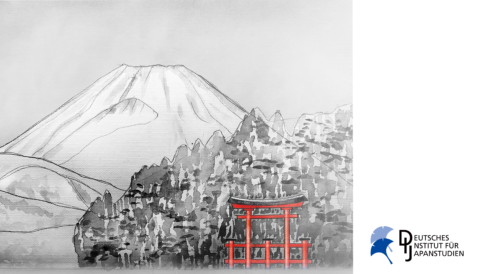 Das Deutsche Institut für Japanstudien wünscht erholsame und frohe Festtage und einen guten Start in ein erfolgreiches Jahr des Tigers!
Das Deutsche Institut für Japanstudien wünscht erholsame und frohe Festtage und einen guten Start in ein erfolgreiches Jahr des Tigers!
The German Institute for Japanese Studies wishes you a happy holiday season and a successful Year of the Tiger!
ドイツ日本研究所一同、皆様のご多幸と来るべき新年が成功の年になることを祈念いたします。
Winter issue of DIJ Newsletter published
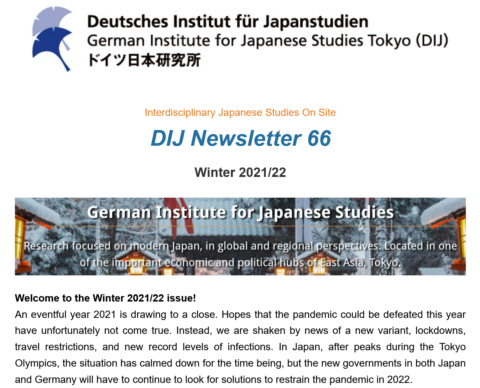
We have just published the winter issue of our DIJ Newsletter featuring updates on our research, publications, and events, including Web-Forum sessions on Digital Transformation; new publications in our DIJ Monographs and Miscellanea series; introducing our new staff member Luise Kahlow; updates on our Bandō Collection; activities of our alumni; an Advent Book Gift Campaign; new videos on our DIJ YouTube channel and much more. We hope you will enjoy exploring this new edition of the DIJ Newsletter. If you haven’t done so yet, you can subscribe to receive it directly to your inbox. The full issue and subscription form are available here.
Research paper analyses self-reflexivity in quantitative research
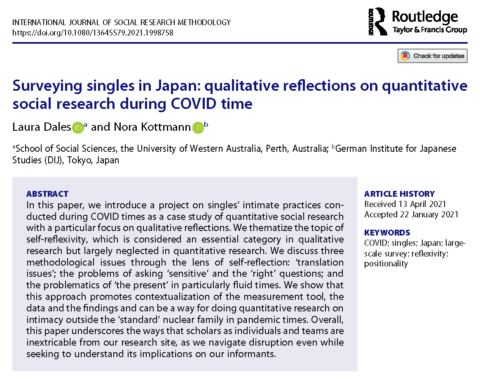
A new research paper by Laura Dales (University of Western Australia) and DIJ principal researcher Nora Kottmann analyses self-reflexivity, which is considered an essential category in qualitative research but largely neglected in quantitative research. “Surveying singles in Japan: qualitative reflections on quantitative social research during COVID times” (International Journal of Social Research Methodology, online first) discusses three methodological issues through the lens of self-reflection: ‘translation issues’; the problems of asking ‘sensitive’ and the ‘right’ questions; and the problematics of ‘the present’ in particularly fluid times. The authors show that this approach promotes contextualization of the measurement tool, the data and the findings and can be a way for doing quantitative research on intimacy outside the ‘standard’ nuclear family in pandemic times. The paper is an outcome of Nora’s research project COVID-19 and its effects on singles in Japan: Personal relationships and practices of intimacy in the time of ‘social distancing’ and ‘self-discipline’.




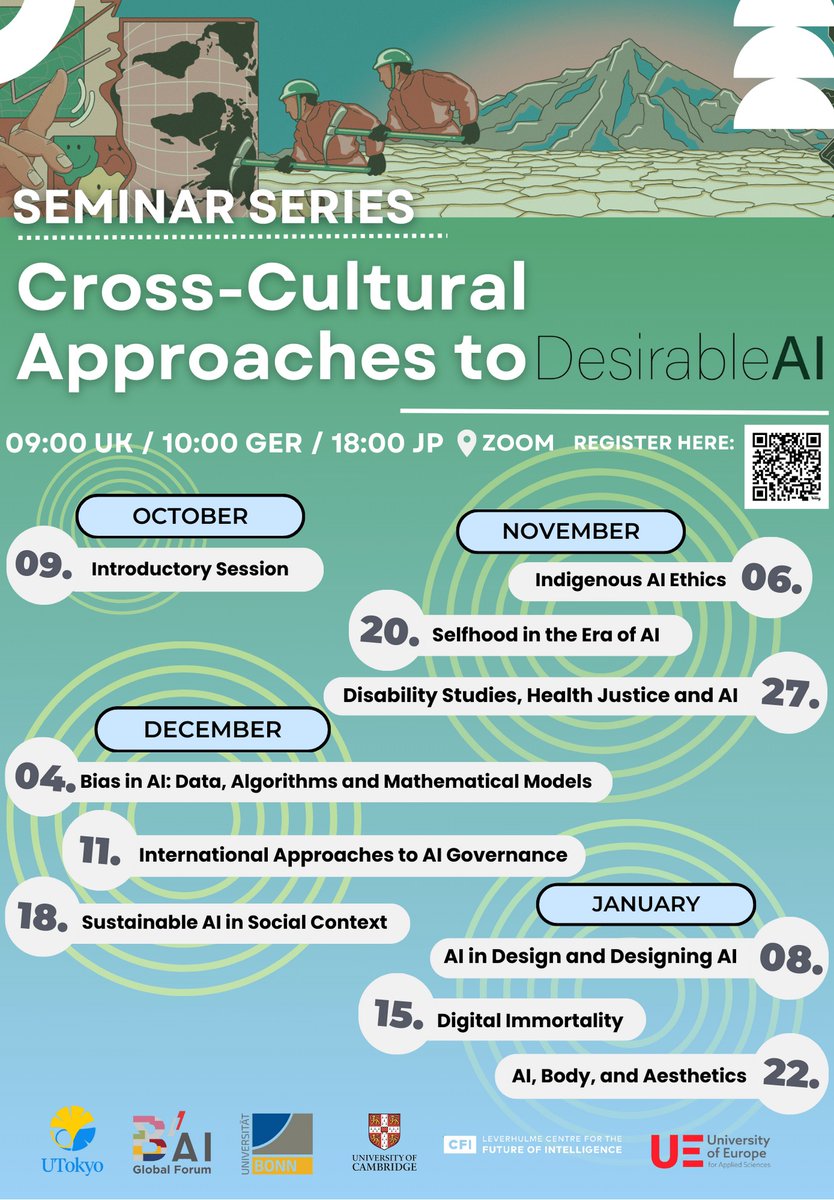



 Open Access
Open Access
